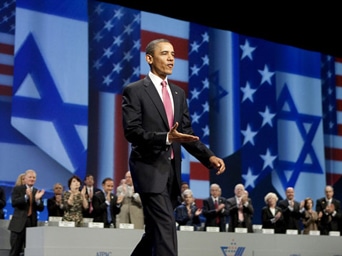Tag: Foreign Policy
U.S. Favorite al-Maliki Persecuting His Enemies
Prime Minister Nouri al-Maliki’s “harassment and persecution of anyone deemed a threat to himself or his party has dramatically reduced freedom throughout Iraq,” a noted journalist reports.
Operation Cast Lead and a 2012 Deja Vu
Exactly three years after Operation Cast Lead, Israel is threatening another invasion on Gaza while Hamas leaders order a halt to all attacks on Israel.
The Cost of Israel to Americans
The most serious dangers facing Americans today stem from our "special relationship" with Israel. by The Council For The National Interest
Foreign Powers Have Dangerous Designs In Balochistan
Balochistan has figured high on the agenda of USA because of its geo-strategic importance. Former USSR too had toyed with the idea of Balochistan getting separated and coming under its influence since it provided the shortest route to warm waters.
BREAKING NEWS: UN Vote on Full Libya Intervention – VT...
Dear Folks, This additional 'we told you so' piece is not about stroking our egos, but about saving the Libyan revolution and the momentum of ridding Libya of its Neanderthal dictator and his corrupt regime. This be no means guarantees that democratic reform will keep them free, as elite corruption has rendered that institution a sock puppet for international mobsters, loyal to no country, or people...only to themselves.
GILAD ATZMON: American Bloody Pragmatism
by Gilad Atzmon
After killing hundreds of thousands of Muslims in the name of democracy, the White House has now decided that ‘stability in the...
Obama’s Conflicting Policy in South Asia
By Sajjad Shaukat:
Most alarming point in this respect is that Indian sinister strategic designs under the pretext of so-called Islamic terrorism are not only creating obstacles in the East-West cultural cooperation, but are also taking the world to the brink of clash of civilizations.
Foreign Policy Briefing 6/7/10
Israel has become a "strategic liability" for the U.S., suggests Anthony Cordesman of the Center for Strategic and International Studies. Cordesman adds the attack on the Turkish ship to a series of "major strategic blunders," by Israel. [Cordesman and CSIS are impeccably "hyper-centrist," so this is a good sign - JFP.
Foreign Policy Briefing 6/2/10
Nine high-profile experts, including former weapons inspector David Kay and former Under Secretary of State Tom Pickering, said world powers should seriously consider the Iran nuclear fuel swap, Reuters reports. "We urge the so-called Vienna Group (Russia, France, the United States, and the IAEA) to seriously pursue this proposal as an opening for further diplomatic engagement with Iran on outstanding issues of concern," the experts said.
Foreign Policy Briefing 5/24/10
Brazil says the US and other Western powers prodded Brazil to try to revive the U.N. fuel swap deal proposed last October. "We were encouraged directly or indirectly ... to implement the October proposal...and that's what we did," said Foreign Minister Amorim. In a letter to Brazilian President Lula two weeks ago, President Obama said an Iranian uranium shipment abroad would generate confidence. "From our point of view, a decision by Iran to send 1,200 kilograms of low-enriched uranium abroad, would generate confidence and reduce regional tensions by cutting Iran's stockpile," Obama said.
Foreign Policy Briefing 4/20/10
94 percent of Kandaharis interviewed last December prefer negotiating with the Taliban to military confrontation, Gareth Porter reports for Inter Press Service. Ninety-one percent supported the convening of a "Loya Jirga", or "grand assembly" of leaders as a way of ending the conflict. Interviewers conducted the survey only in areas which were not under Taliban control. An unclassified report on the survey was published in March by Glevum Associates, a "strategic communications" company under contract for the Human Terrain Systems program in Afghanistan. All this undermines the U.S. claim that the Kandahar offensive will be supported by locals, Porter notes.
Foreign Policy Briefing 4/9/10
Regardless of whether U.S. Special Forces removed bullets from the bodies of the Afghan women they just killed, as charged by the victims' relatives - and if they did, what their motivation was for doing so - spreading the story that the women's bodies had been found "tied up" and "gagged," as NATO did in a Feb. 12 press release still posted on its web site, if that was not true, would meet any disinterested observer's definition of the word "coverup."
Foreign Policy Briefing 4/7/10
The fight over the war supplemental is tremendously important, because Congressional pressure can move Administration policy, even when critics of Administration policy don't command a majority of votes. This is especially true when, as in this case, critics are in the majority in the President's own party, and when, as in this case, the policy under pressure is an international policy which is also under significant international pressure.
Foreign Policy Briefing 3/31/10
U.S. forces hope to control Kandahar and surrounding areas by late summer, the Washington Post reports. Officials have pressed local leaders to eject the Taliban or their areas will be the focus of expanding military operations. Among those specifically warned by U.S. military commanders is Ahmed Wali Karzai, the elected head of Kandahar's provincial council, the unquestioned power broker in the province and brother of President Hamid Karzai [and also President Karzai's representative in talks with Taliban leader Mullah Baradar weeks before Baradar's arrest, a fact curiously unmentioned by the Post or the very similar New York Times story - JFP.]
Foreign Policy Briefing 3/27/10
The Pentagon wants $33 billion in additional funding to pay for the war in Afghanistan this year and train the Afghan military, the Christian Science Monitor reports. Defense Secretary Gates and Secretary of State Clinton appeared before Senate appropriators to defend the war supplemental, which is on top of the $708 billion baseline budget submitted to Congress in February.
Foreign Policy Briefing 3/17/10
Israeli officials rejected demands by the Obama Administration to cancel a building project in East Jerusalem, the New York Times reports. Secretary of State Clinton said Washington expected action from Israel, and a key US demand is that Israel neither promote nor permit "provocative" acts, meaning anything that would disturb the atmosphere as Palestinians and Israelis prepare for indirect peace talks. That would include new building projects.
Foreign Policy Briefing 3/13/10
Secretary of State Clinton warned Israeli Prime Minister Netanyahu Friday that Israel had sent a "deeply negative signal" about the U.S.-Israeli relationship and urged him to take immediate steps to demonstrate it was interested in renewing efforts at a Middle East peace agreement, the Washington Post reports. Her call, made in the wake of the embarrassment suffered by Vice President Biden when Israel announced it would build 1,600 housing units in a disputed area of Jerusalem, was an unusually tough message for the longtime U.S. ally, the Post says.
Foreign Policy Briefing 3/12/10
An open diplomatic row with Israel during the visit of Vice President Biden has shined a spotlight on the U.S. failure to rein in Israeli settlement ambitions and deepened Palestinian suspicions the US is too weak to broker a deal, AP reports. The Palestinians largely lost faith in the U.S. as a broker after Obama tried - and failed - to get the Netanyahu government to stop building on lands Palestinians claim for a future state, AP says.
Foreign Policy Briefing
Some American doctors are pleading U.S. officials to keep the Navy hospital ship Comfort in Haiti, the Baltimore Sun reports. University of Southern California surgeon Randy Sherman, medical director for the aid organization Operation Smile, said "there is no doubt" there are enough earthquake victims to keep the Comfort busy. He thinks it could operate at high volume for at least three more months. US doctors say Haiti is replete with patients whose orthopedic injuries have healed improperly and require complex surgeries that only the Comfort can provide.
Foreign Policy Briefing 3/2/10
This summary briefing comes to us through the courtesy of Just Foreign Policy.
Summary:
U.S./Top News
1) Japan's Social Democratic Party, a junior partner in the ...
Foreign Policy Briefing 2/26/10
The Afghan human rights commission reported that 28 civilians had been killed so far in NATO's offensive on Marja, AP reports. The commission based its numbers on witness reports. NATO has confirmed at least 16 civilian deaths.
Foreign Policy Briefing 2/24/10
Rep. Kucinich wrote to Defense Secretary Gates, demanding that the U.S. comply with its obligation to protect Afghan civilians under international law, following a US attack on a civilian convoy reported to have killed 27 civilians. Kucinich demanded information on the decisions that led to the strike within two weeks, threatening to force a House vote demanding release of documents on the strike.
Foreign Policy Briefing 2/23/10
Dutch Prime Minister Balkenende said he expected Dutch troops to come home from Afghanistan before the end of the year, after efforts to keep them there longer caused the government to collapse, the New York Times reports. The war in Afghanistan has been increasingly unpopular among voters in in many parts of Europe, creating strains between governments trying to please the US and their own people.
Foreign Policy Briefing 2/18/10
The New York Times today published a monstrous Op-Ed complaining that the U.S. is being too careful to avoid civilian deaths in Afghanistan, notes Glenn Greenwald for Salon. The US military has "begun basing doctrine on the premise that dead civilians are harmful to the conduct of war," the op-ed complains. "The trouble is, no past war has ever supplied compelling proof of that claim." Greenwald notes that in addition to publishing the monstrous op-ed, the New York Times essentially hides the identity of the author from the reader, by not explaining who she is, who she works for, what economic interests she might represent, and what is the basis of her alleged expertise. [Ask the New York Times Public Editor to investigate: public@nytimes.com - JFP.]
Foreign Policy Briefing 2/16/10
At least nineteen civilians have been killed so far in the US/NATO offensive in Marjah, Democracy Now reports. DN interviewed Wall Street Journal reporter Anand Gopal, who says the assault in Marjah is perceived as a "show of force" by coalition forces that will change little. Gopal says it's very difficult for reporters to get to Marjah; almost all the reporters who are there are embedded reporters, so they're only seeing one side of the story; and we won't know for some time if there are many more cases of civilian deaths.
Foreign Policy Briefing 2/11/10
Pakistan has told the US it wants a central role in resolving the Afghan war and has offered to mediate with Taliban factions, the New York Times reports. So far, the US has been more eager to push Pakistan to fight Taliban than to negotiate with them, and has not endorsed Pakistan's new approach. One strand of thinking within the Obama administration calls for allowing the Pakistanis to keep the Haqqanis as part of Pakistan's sphere of influence in southern Afghanistan, but only if Pakistan forces the Haqqanis to break with Al Qaeda and to push militants out of its areas, a US official said.
Foreign Policy Briefing 2/6/10
A group of ex-Taliban officials have prepared a "road map" to promote a political settlement between the Taliban and the Karzai government, Gareth Porter reports for Inter Press Service. The first step would be an agreement between Karzai and the Taliban about no killing of doctors and no damage to roads by the Taliban, in return for no night raids and detention by the United States.





